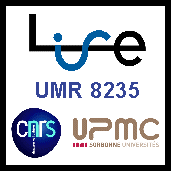Study of interfacial processes in lithium-ion technology by operando analysis
Étude des processus interfaciaux en technologie lithium-ion par analyses operando
Résumé
New generations of lithium-ion batteries (LIBs), incorporating new electrode materials operating at a higher voltage, such as LiNi0.5Mn1.5O4 (LNMO), are promising but show a rapid degradation of their performance. This can be explained by the irreversible reactions taking place at the electrode/electrolyte interfaces during cycling: oxidation and reduction of the electrolyte at the electrodes (formation of (semi)-passive interphases SEI and CEI) as well as the dissolution of the transition metals of the LNMO material (cross-talk phenomena). Therefore, the work carried out during this thesis has led to the development of a set of innovative analytical techniques necessary for the characterization of these interfacial processes during the operation of LIBs. On the one hand, although Raman spectroscopy is used to characterize battery materials, the use of plasmonic amplifiers (silica coated gold nanoparticles) was introduced to amplify locally the Raman signal and reveal the dynamics of compositions of the electrode/electrolyte interfaces: this is the SHINERS method (Shell-Isolated Nanoparticles-Enhanced Raman Spectroscopy). The optimization of this technique then allowed to investigate the role of the nature of the electrode materials and of the electrolyte compositions on the passivation mechanisms of the electrodes. On the other hand, the cross-talk process on LNMO systems was studied via the development of spectroscopic (fluorescence and X-ray absorption) and electrochemical (real-time electrochemical titration of dissolved manganese) methods.
De nouvelles générations de batteries lithium-ion (LIB), intégrant de nouveaux matériaux d'électrode fonctionnant à une tension plus élevée, tels que LiNi0,5Mn1,5O4 (LNMO), sont prometteurs mais présentent une dégradation rapide de leurs performances. Celle-ci peut s’expliquer par les réactions irréversibles ayant lieu aux interfaces électrode / électrolyte en cyclage : l’oxydation et la réduction de l’électrolyte aux électrodes (formation d’interphases (semi)-passives SEI et CEI) ainsi que la dissolution des métaux de transition du matériau LNMO (phénomène de contamination chimique croisée). Les travaux réalisés durant cette thèse ont ainsi abouti au développement d’un ensemble de techniques d’analyse innovantes permettant la caractérisation de ces processus interfaciaux lors de l’opération des LIBs. D’une part, bien que la spectroscopie Raman soit utilisée pour caractériser des matériaux de batteries, l’utilisation d’amplificateurs plasmoniques (nanoparticules d’or couvertes de silice) a été introduite pour amplifier le signal et révéler des dynamiques de compositions des interfaces électrode/électrolyte : c’est la méthode SHINERS (Shell-Isolated Nanoparticles-Enhanced Raman Spectroscopy). L’optimisation de cette technique a alors permis d’investiguer le rôle de la nature des matériaux d’électrode et de la composition des électrolytes sur les mécanismes de passivation des électrodes. D’autre part, le phénomène de contamination chimique croisée sur les systèmes LNMO a été étudié via le développement de méthodes spectroscopiques (fluorescence et absorption des rayons X) et électrochimiques (technique de titrage électrochimique du manganèse dissout en temps réel).
Origine : Version validée par le jury (STAR)

